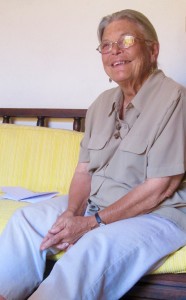(Third in an ongoing – and perhaps never-ending – series focusing on some of the remarkable, creative, and wise older women of San Miguel de Allende, Mexico)
When asked how her rural-community learning center, Ojala Niños, came to be, Elsmarie Norby tells a story:
After a heartbreaking breakup about ten years ago, when, as she says, she “just wanted to drop out and bury my ashes under a cactus,” Elsmarie, now 76, bought a small piece of land outside of San Miguel de Allende and built a little house on it. At first, she found, in this poor, indigenous village, where running water and electricity are intermittent and the people still collect wood for cooking, the adults saw her as an outsider, an interloper, and she felt unwelcome. But the children of the community soon changed all that.
“My mother, who was an evangelical Christian, always used to quote Scripture: ‘Seek ye first the kingdom of God, and all these things will be added unto you.’ Well, I felt that the kingdom of God had sought me, in the form of these children. What I’ve learned in my own life is that the kingdom of God is always in front our faces,” Elsmarie told me in a recent interview in the quietness of my house.

“The children came by my home with great curiosity. To make friends, I gave them pencils, then paper and books. I was very impressed with their creativity, kindness and joyful presence. I realized that with a space and some materials, these children could put themselves on a path of learning. Soon most of the children in the community, of all ages, were coming to my house for these opportunities.”
At one point early on, she said, she took some of the children on their first “field trip” to San Miguel to visit an art show of works by other children. “The kids from my community clung together and just looked at everything in awe,” she said. “The next day, two cousins, Pablo and Martine, then about 7 and 8 years old, came to my house carrying a big plastic bag full of paper. It turned out that the bag was filled with beautiful artwork by Martine. ‘I just do these drawings at home when I’m bored,’ he told me. ‘I didn’t know it was called art.’”
I’ve written in a recent WOW Factor post about Ojala Niños, the marvelous nonprofit after-school educational and enrichment program Elsmarie created in 2007 to foster the talents of the children in her adopted community. (Please see “Hope for the Niños,” published March 19). In this post I’d like to focus on the remarkable woman, Elsmarie.
The daughter of Swedish immigrants, she grew up in Oak Park, Illinois, outside of Chicago, and studied music from the age of four. After earning a bachelors in music from St. Olaf College, she and her then-husband travelled extensively in Europe, where her first child was born.
Twenty-one years ago, twice divorced and her four children grown up and on their own, Elsmarie decided to visit San Miguel de Allende, Mexico, on the recommendation of friends. “I remember it all so clearly,” she told me. “It was the first week of January, 1995. I’d arrived at night. The next morning I took my first look out of the window of my hotel, and I thought, “This is IT! I’m HOME. I’d been searching for home my whole life.”
For the next twelve years in San Miguel, Elsmarie devoted herself to her music and photography. Her greatest devotion was in gathering children from orphanages, neighborhoods, and rural communities to make choirs. This activity led to a young people’s music program in public schools. “Singing children are the angels among us,” she said to me, smiling.
When I asked Elsmarie what sustains her on a daily basis, she told me one of her secrets: Every morning, alone in her house or in her car, she sings a song aloud. “It’s an e. e. cummings poem set to music by two rabbi friends many years ago,” she said, “and it goes like this –” She sang it to me joyfully in my living room:
i thank You God for most this amazing day:
for the leaping greenly spirits of trees
and a blue true dream of sky; and for everything
which is natural which is infinite which is yes
(i who have died am alive again today,
and this is the sun’s birthday; this is the birth
day of life and of love and wings: and of the gay
great happening illimitably earth)
how should tasting touching hearing seeing
breathing any–lifted from the no
of all nothing–human merely being
doubt unimaginable You?
(now the ears of my ears awake and
now the eyes of my eyes are opened)
# # #
